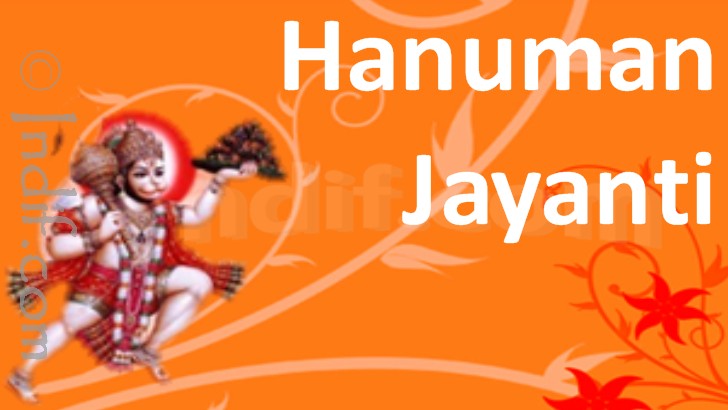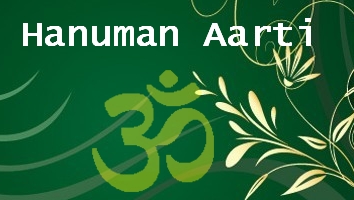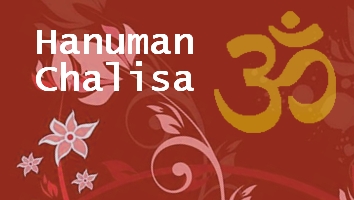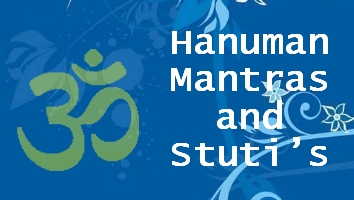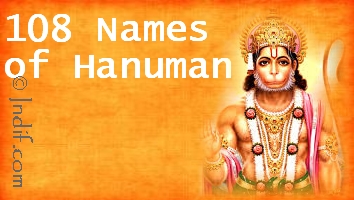![]()
In the month of Chaitra, along with Bhagwan Ramchandra,the manifestation of Ramchandra's ardent devotee Hanumanji (the monkey god widely venerated throughout India), on Chaitra Poornima. Hanuman Jayanti is celebrated to commemorate the birth of Hanuman Ji.
Hanuman is the symbol of strength, divinity, courage, devotion, and energy. He was born to (Wind-God) Kesari and Anjani. According to legends he was born as a monkey god to serve Parmatama Lord Ram. He is worshipped in folk tradition as a deity with magical powers and the ability to conquer evil spirits. Also called by the names, Maruti, Pavanputra, Bajrangbali and Mahavira. Lord Hanuman is considered to be an incarnation of Lord Shiva. Hanuman is worshipped by people to attain knowledge, wisdom, strength and valor. It is believed that reciting Hanuman Chalisa brings health, wealth, success and helps in overcoming fears of all kind.
Hanuman is commonly depicted in the form of a Vanara, a humanoid creature described in the the Hindu epic Ramayana. He is also a shape-shifter, though, with magical powers that allow him to take many forms, move mountains and control the clouds.
The Birth Story of Hanumanji:
In heaven there was a very famous apsara (courtesan) named Punjikasthala. On a certain occasion she insulted one of the rishis. As a result she got a curse that she would be born as a female monkey. After her birth she was named Anjana. Her husband's name was Kesari. Because Anjana had no son, she began to do penance. She gave up eating and drinking. She prayed to god Vayu not only to get her a son, but that he should be powerful and swift, just like god Vayu himself.
Vayu answered: "Tathastu", "Let it be as you desire."
In the morning of the first 14th day of Chaitra in a cave on the Rushyamuk mountain, Anjana gave birth to her son Hanuman. Soon after his birth Hanuman came out of the cave and, as the sun was rising, he flew towards the sun to eat its reddish rays.
As he flew towards the sun, Rahu stood in his way. But with a stroke of his tail he pushed Rahu aside. Then came Ketu, but he also was removed, and Hanuman flew ahead towards the sun. Then heaven became worried. Indra mounted his elephant "Airavat", and wondered in his mind, "Who is this extraordinary child going out to eat the sun?" Indra became angry and flung his weapon "vajra" (thunderbolt) on Hanuman, who was caught unawares. He was hit on his left knee, and fell on the top of a high mountain.
Vayu came to know about Hanuman's fall. In his anger Vayu stopped the wind ("vayu"). The very life of the gods became imperilled. The condition of all living beings became extremely precarious. All began to pray to Vayu to give up his anger. Then Indra went to meet the unconscious Hanuman, praised him for surviving the stroke of his weapon, and called him "Maruti" or "son of the wind". As a boon Indra said, "You will not be afraid of death" ("Ichchamarni"). Brahmadev also said: "Nobody will be able to kill you with any weapon in war." With this Hanuman became almost invincible. Then Vayu was pleased and the wind began to blow gently, and life returned to all living creatures. Hanumanji also obtained boons from Varuna deva (water deity) and Yama - deity of death, victory and immortality. From Brahma he obtained the power of inducing fear in enemies, of destroying fear in friends, to be able to change his form at will and to be able to easily travel wherever he wished. From Mahadevji he obtained the boons of longevity, scriptural wisdom and ability to cross the ocean.
Laal Deha Laalee Lasay, Aru Dhari Laala Langoora I
Bajra Deha Daanawa Dalana, Jai Jai Jai kapi Soora II
Meaning: Your body is red. Red Vermilion graced over it. You wear a Langot of red color. Your body is as solid as a rock. You are the destroyer of demons. O Valiant! You ever be a victor.
Celebrations:
On this day people offer sweets and fruit, specially bananas, to the god. Since Hanuman is a monkey god, monkey's in zoos and neighboring areas are also objects of veneration on this day. Men also fast from morning till evening.Games like wrestling are a common part of this festival. The devotees visit temples and apply tilak of sindhoor to their foreheads from the Hanumans body as this is considered to be good luck. According to the legend Sita was applying sindhoor to her head, Hanumans Ji questioned why and replied that this would ensure a long life for her husband. Hanuman then smeared his entire body with sindhoor, in an effort to ensure Rama�s immortality. Cultural programs are organised in most of the Hindu temples on this day.
Regional Celebrations:
Hanuman Jayanti is observed during different dates in different regions of India.
Andhra Pradesh: Hanuman Jayanthi is celebrated for 41-days which starts on Chaitra Poornima and ends on the tenth day during Krishna Paksha in Vaishakha month. In Andhra Pradesh devotees begin 41-days Deeksha on Chaitra Poornima and conclude it on Hanuman Jayanti day.
Orrisa: In Orrisa, Hanuman Jayanti is celebrated during Vishubha Sankranti. Some communities celebrate Hanuman Jayanti during Diwali Festival, i.e, on Narak Chaudas or Chotti Diwali.
Tamil Nadu: In Tamil Nadu Hanuman Jayanti is known as Hanumath Jayanthi and observed during Margashirsha Amavasya. According to Gregorian calendar Tamil Hanuman Jayanti falls in the month of December or January.
Karnataka: In Karnataka, day dedicated to Hanuman is the Hanumantha Vrata, which is celebrated in Margashirsh month, according to Gregorian calendar which falls in the month of November or December.
His devotion to Rama was so great that he is still worshipped by the Hindus as the ideal of a true servant of the Lord
- Swami VivekanandaHanuman, the devotee of Rama, summed up his philosophy in these words: When I identify myself with the body, O Lord, I am Thy creature, eternally separate from Thee. When I identify myself with the soul, I am a spark of that Divine Fire which Thou art. But when I identify myself with the Atman, I and Thou art one.
- Swami Vivekananda

